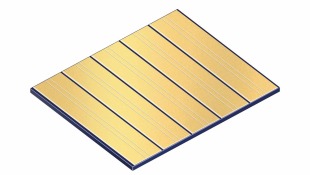With its SPL BF98-40-5 laser bar Osram Opto Semiconductors has succeeded in combining power and beam quality like never before. Thanks to its high brilliance, the laser diode considerably reduces the complexity of coupling light into fibers. Diode or fiber laser systems for material processing can be made simpler and therefore more cost-effective. Even at its maximum output of more than 60 watts the component has an impressively long life.
For its new SPL BF98-40-5 laser bar Osram Opto Semiconductors has optimized the chip design in terms of beam quality. The result is a laser with a wavelength of 976 nanometers (nm) and high brilliance – the yardstick for the beam quality of a laser. The laser achieves a brilliance of 3 watts (W) per millimeter and solid angle (W/mm*mrad) at an optical output of 44 W – an unsurpassed combination. The SPL BF98-40-5 laser bar is 5 mm wide and consists of five emitters, each 100 micrometers (μm) wide and each with cavity length of 4 mm.
Brilliant laser sources generate a narrow beam of light with extremely small beam divergence and high power density. The lateral divergence of the beam emitted by the SPL BF98-40-5 is between 6° at 30 W and approx. 9.5° at 60 W. This divergence was calculated for the portion of the laser beam containing 95 percent of the optical output power.
 |
|
With its unique brilliance of 3 W/mm*mrad at an output of 44 W the SPL BF98-40-5 laser bar reduces the system costs for fiber-coupled diode lasers. (Photo Credit: Osram) |
Simple injection into fibers
With its unique brilliance the SPL BF98-40-5 laser bar is setting new standards for fiber-coupled systems. The beam quality of a laser is a crucial factor for coupling laser light into optical fibers. The lower the brilliance, the less light is coupled into the fiber. This in turn makes the systems more inefficient and more expensive. Conversely, a brilliant light source greatly simplifies the design of the optical system. "Our new laser bar can significantly reduce the system costs for fiber-coupled diode lasers", said Dr. Christian Lauer, Laser Bar Developer at Osram Opto Semiconductors.
Fiber-coupled diode laser systems are used predominantly in the automobile industry for vehicle chassis welding, soldering and coating. The laser diodes are also often used for pumping fiber lasers. The wavelength of 976 nm is ideal for pumping ytterbium-doped fiber lasers in particular. These are laser types that can be used for cutting metal thanks to their excellent beam quality. Osram has therefore specifically matched the wavelength of the SPL BF98-40-5 to this pumping application.
Very long life
Apart from its high brilliance, the new laser bar offers excellent electro-optical efficiency of e.g. 65 percent at 44 W. This reduces the level of cooling needed for the laser diode and improves the efficiency of the entire system. The temperature rise at the chip is therefore not as great so the laser exhibits very good aging stability. Tests show a drop in output of less than one percent after 4000 hours of operation at an optical output of 65 W and a cooling water temperature of 25°C.
Osram Opto Semiconductors defined the fundamental principles for developing the high-power high-brilliance laser bar within the HEMILAS project sponsored by the Germany Ministry for Education and Research (BMBF).
|
Technical data:
|
|
Bar dimensions (W x L)
|
5 mm x 4 mm
|
|
Emitters
|
Five emitters each with 100 µm emission width at 1 mm spacing
|
|
Wavelength
|
976 nm
|
|
Maximum output
|
60 W
|
|
Brilliance
|
3 W/mm*mrad at 44 W
|
|
Efficiency
|
65% at 44 W
|





 CN
TW
EN
CN
TW
EN






